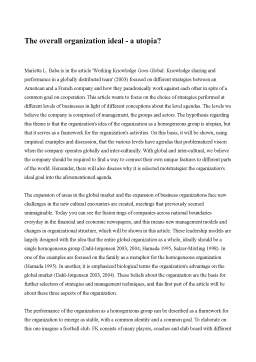Extras din referat
Marietta L. Baba is in the article 'Working Knowledge Goes Global: Knowledge sharing and performance in a globally distributed team' (2003) focused on different strategies between an American and a French company and how they paradoxically work against each other in spite of a common goal on cooperation. This article wants to focus on the choice of strategies performed at different levels of businesses in light of different conceptions about the level agendas. The levels we believe the company is comprised of management, the groups and actors. The hypothesis regarding this theme is that the organization's idea of the organization as a homogeneous group is utopian, but that it serves as a framework for the organization's activities. On this basis, it will be shown, using empirical examples and discussion, that the various levels have agendas that problematized vision when the company operates globally and inter-culturally. With global and inter-cultural, we believe the company should be required to find a way to connect their own unique features to different parts of the world. Hereunder, there will also discuss why it is selected motstrategier the organization's ideal goal into the aforementioned agenda.
The expansion of areas in the global market and the expansion of business organizations face new challenges in the new cultural encounters are created, meetings that previously seemed unimaginable. Today you can see the fusion rings of companies across national boundaries everyday in the financial and economic newspapers, and this means new management models and changes in organizational structure, which will be shown in this article. These leadership models are largely designed with the idea that the entire global organization as a whole, ideally should be a single homogeneous group (Dahl-Jørgensen 2003, 2004, Hamada 1995, Salzer-Mörling 1998). In one of the examples are focused on the family as a metaphor for the homogeneous organization (Hamada 1995). In another, it is emphasized biological terms the organization's advantage on the global market (Dahl-Jørgensen 2003, 2004). These beliefs about the organization are the basis for further selection of strategies and management techniques, and this first part of the article will be about these three aspects of the organization.
The performance of the organization as a homogeneous group can be described as a framework for the organization to emerge as stable, with a common identity and a common goal. To elaborate on this one imagine a football club. FK consists of many players, coaches and club board with different tasks. Despite all the different work tasks the different levels of the club, so the goal for soccer club is the same: win matches. If the players the club should have a different agenda than the primary goal would not have achieved the club to win games to the extent desired. This analogy can be transferred to the notion of the homogeneous organization. Hamada (1995) describes Ogawa, a chief of a Japanese owned company (Kasugai) with offices in USA (Kasugai USA), as a leader with loyalty to the leadership in Japan and with the leadership approach based on Japanese leadership culture. Kasugai sees itself as a large family (1995:176) and Ogawa leadership style reflects this idea with the intimate boundaries a family ties often represents. This aspect will come back to later in the article, but it is relevant to family metaphor of the concept of the homogeneous organization is that there are differences in how you look at the family in different parts of the world. For example, in the Middle East is a very ambivalent relationship between the men of the same family in matters of authority relationship where respect and subservience in one context does not match the authority and supremacy of one another, in cases where the two contexts will meet at the same time (Hylland- Eriksen 2007:65). In IKEA's' familie' relationship based on equality and that everyone can work on the floor if the need is there (Salzer-Mörling 1998). Idea of the 'IKEA-massa', which deals with the idea not to stand out using the 'nice clothes', for example, suit, or other symbols or ways to behave that can distance itself from the other employees, are a cornerstone of the IKEA ideal unity. One can in a way to interpret the family metaphor through the idea that blood is thicker than water, but this idea is difficult to be reconciled with the different cultural contexts when it demanded an inter-cultural cooperation.
In the aforementioned examples, it is emphasized that this is about perceptions of the organization, ideas to reach a common goal and will create an inclusive effect in the IKEA case. One can in a sense, calling this "the parent organization ideal '. The term 'parent' means that this notion of the homogeneous organization is the framework for what kind of strategies the organization puts forth. 'The overall organization ideal' is like interpreting the primary basis for how the organization wants to be seen, both internally and externally. One can also say that this ideal is a utopia as seen from the house hold in which several forces pull in different directions, but perhaps it is therefore important for the management of the company to communicate internally to achieve the desired effect. This communication may thus claimed to be the organization's strategy toward the organization's employees.
Preview document
Conținut arhivă zip
- The Overall Organization Ideal - A Utopia.doc
















